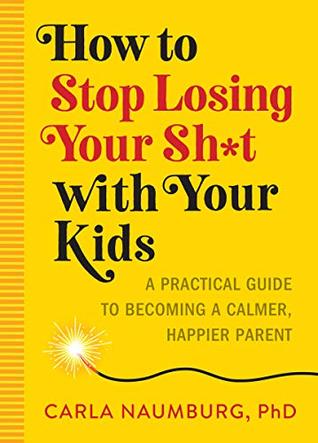More on this book
Community
Kindle Notes & Highlights
Read between
May 1 - May 22, 2025
The purpose of the anything else is to (a) calm you down, (b) diffuse the moment, and (c) redirect the tense energy that’s building up.
Do the best you can with what you have. This is not about perfection. It’s just about not losing your shit.
Put your hands flat on the counter or feel your feet on the floor. Putting your skin in contact with a hard surface can help you feel more grounded and calm.
Even so, shit will still be lost. It will happen. It will happen less often and less intensely, but it will happen. This is such a common dynamic that parenting experts have come up with a handy little phrase for it: Rupture, Repair, Repeat.
The first step is to calm down. This is nonnegotiable. Your body has been flooded with stress hormones, and it takes time for your parasympathetic nervous system to kick in, shut down the power to your buttons, and get your adulting brain back in the game. If you rush into reconnection while you’re still triggered, there’s a good chance your buttons will be pushed yet again and you’ll end up snapping instead of snuggling. As long as your child is safe, strap on your oxygen mask and take care of yourself first.
Treating yourself with kind words and actions is the most effective way to avoid losing your shit again in the near future.
Whenever your buttons get all lit up, each time you get stuck in a cranky, pissy, about-to-lose-your-shit headspace, get curious about, well, anything. If you’re too wound up to think clearly about what you’re feeling or doing, then do anything that will activate your curious brain. Read a riddle book, fit a piece into a puzzle, or sweep the floor. (Yes, sweeping is a curiosity exercise, especially when you live with kids. You have to inspect the floor pretty damn carefully unless you feel like sweeping three more times.) Even if you don’t get any relevant information, you’ll be cooling off
...more
Your apology will help strengthen your relationship, increase your child’s respect for you, and as an added bonus, you’ll be modeling the very behavior you want them to practice as well. That’s good stuff right there.
apologizing for your behavior doesn’t mean your kid wasn’t being a turkey or pushing your buttons and it doesn’t mean there won’t be another conversation and maybe even some limit setting after the apology. But you need to set aside that issue for now. Your children won’t be able to hear what you’re saying or think clearly about what you’re trying to teach them if their little brains and bodies are still flooded with stress hormones. So hold off on The Big Talk until everyone is cooled off again. There’s an easy way to remember this: connection before redirection. So calm down, apologize to
...more
You don’t have to say you’re sorry for feeling cranky or frustrated or exhausted or anything else. There is absolutely nothing wrong with any emotion, ever, no matter how yucky it may feel. You may, however, need to apologize for your behavior. The distinction between how you feel and what you do is an important one for both you and your children. The ability to experience difficult feelings without acting on them is a powerful life skill (and one that you probably need more practice with if you’re reading this book).
Say what needs to be said as succinctly and clearly as you can. Too many words or explanations will cloud the moment and confuse your child.
if you’ve been able to apologize but you’re still triggered, do what you can to get the time and space you need. If you can’t get any space (because, you know, kids), then you want to slooooow everything way down, hyper-focus on doing one thing at a time, and take lots and lots of deep breaths.
The four nonnegotiable BuRPs (Button Reduction Practices) for cooling down your buttons are Single-Tasking, Sleep, Support, and Self-Compassion. 9. The following BurRPs will also help you stay calm in the face of chaos: Simplify, Stretch, Seek Silence, Slow Down, Say Thank You, and Breathe. 10. In addition to taking care of your buttons, you must also take space—physical and psychological—from your children. That’s not bad parenting; just the opposite. You’ll be more present and patient and less likely to freak out when you’ve had a little break. 11. The next time you’re on the verge of losing
...more


